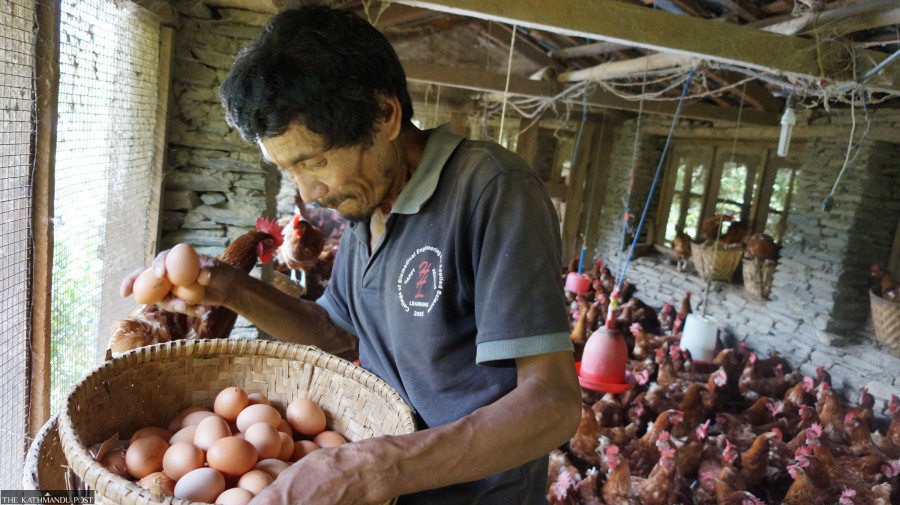Money
The humble egg prices reach historic highs
In Nepal, millions of consumers rely heavily on affordable eggs for their protein intake, as meat and plant protein sources are costly.
Krishana Prasain
Chickens cannot fly far enough, but the price of eggs is flying through the roof.
An egg now costs Rs22.50 in retail, up from Rs17 a year earlier, according to the poultry association.
Nutritionists say this is not good news for consumers hit by inflation who tend to cut budgets for healthy diets due to low income.
When eggs become expensive, it affects consumers in all brackets—from restaurants to bakeries and from canteens to households.
In Nepal, millions of consumers rely heavily on eggs to meet their protein intake due to expensive meat.
According to the Food and Agriculture Organization of the United Nations (FAO), humble eggs offer a practical and impactful opportunity to tackle problems related to undernutrition.
Eggs are almost pure protein of very high quality. They also provide the entire Adequate Intake of vitamin B12 and choline for young children. The essential fatty acid content of eggs may be necessary in pregnancy.
Eggs are popular in many countries and are available at affordable prices.
“Most Nepalis have folic acid deficiency. The egg is one of the good sources of folate, including protein and vitamins, and is easy for people of any age to digest,” said Dr Sudhashree Adhikari, a nutritionist.
“With a price hike, the egg will be out of reach for many people, which might cause protein deficiency. An egg fulfils around 10 grams of protein intake.”
Growing children, including pregnant women and breastfeeding mothers, need more protein for growth and development. “The lack of protein hinders the growth and development of children, including muscle growth,” Adhikari said.
A whole egg contains Vitamin A, Vitamin B9, Vitamin B5, Vitamin B12, Vitamin B2, Vitamin D, E, B6, minerals—phosphorus, selenium, calcium and zinc.
Daily consumption of eggs might lower the risk of stroke. The antioxidants lutein and zeaxanthin in eggs help prevent eye diseases like cataracts and age-related muscle degeneration.
Choline in eggs is essential for pregnant women and breastfeeding mothers, as it helps the baby’s brain development.
“A healthy adult can eat 1–2 eggs daily without hesitation. A whole egg contains almost all the nutrients a body needs,” Dr Atul Upadhyay, another nutritionist, told the Post in a recent interview.
Recently, the retail price of eggs increased twice a month as the Nepal Layers Poultry Association hiked the farmer price, ultimately increasing the retail price.
Binod Poharel, president of Nepal Layers Poultry Association, said the retail price of an egg is Rs22.50 now.
Pokharel said that the price of eggs was increased as farmers could not recover the production cost for a long time due to the rise in feed prices.
The farm gate price of an egg ranges from Rs14-16 per piece, but due to the multiple layers of middlemen, it becomes expensive when it reaches the consumer’s hand, traders said.
FAO, the specialised agency of the United Nations that leads international efforts to defeat hunger, has set the per capita per year requirement of eggs in developing countries at 48 units.
A person's requirement for meat, a source of protein, is 14 kg per year, while the requirement for milk is 91 litres.
According to data from Nepal’s agriculture ministry, a Nepali eats 18.1 kg of meat and 61 eggs annually, well above the benchmark set by the UN body. The consumption of milk currently stands at 79 litres, still short by 12 litres.
Per capita meat consumption was 9.8 kg per year in 2008 and 9.7 kg in 2000.
Adhikari said that eggs are cheap and easy-to-find food that fulfils protein and vitamin needs better than plant-based proteins, different varieties of legumes, meat, and fish.
Adhikari said the government needs to provide relief on such food products so that many people can access them. “When there is food inflation, and people’s incomes are not increasing, they will reduce their consumption.”
According to the association, egg production this summer has declined to 2.5 million units daily from 6 million in 2023.
“There is a gap between demand and supply as production gets hit in the summer season,” said Pokharel.
“Also, many poultry farmers are leaving the industry after their businesses were hit badly by the Covid pandemic followed by high bank interest rates.”
Consumer rights activists said traders hiked the price of eggs on the pretext that farmers kept a good profit margin for themselves.
Prem Lal Maharjan, president of the National Consumer Forum, said poultry farmers do not benefit from the hiked price, as all the money goes into the pockets of traders or middlemen.
Medium egg, which used to cost Rs430 per crate (30 pieces), now costs Rs530, a hike of Rs100 in a month.
“This is not a justifiable hike. Traders are profiteering from it, not the farmers,” said Maharjan.
Maharjan said that, earlier, two organisations fixed the price of eggs—the Egg Producers Association and the Nepal Layers Association. The price used to be competitive.
“But now both organisations have merged. There is a monopoly,” he said, according to the Consumer Protection Act, 2018.
The rise in egg prices is a big blow for consumers who have seen vegetable prices double and triple due to the monsoon disasters, which have affected output and cut the supply chain.
Almost all seasonal vegetables have joined the Rs100 per kg club.




 10.12°C Kathmandu
10.12°C Kathmandu














